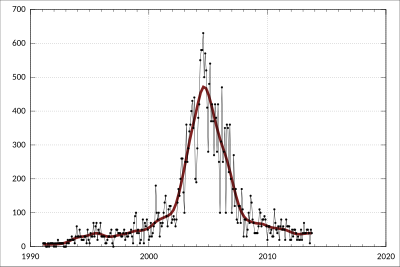South Sudanese Australians
| Regions with significant populations | |
|---|---|
| Victoria | 1,118 |
| Queensland | 715 |
| New South Wales | 561 |
| Western Australia | 489 |
| Languages | |
| Dinka · English · Arabic | |
| Religion | |
| Christianity[1] | |
South Sudanese Australians are people of South Sudanese ancestry or birth who live in Australia. In the 2006 census, there were 19,049 South Sudanese-born Australian residents, making up 0.1% of the population. Many of the South Sudanese-born people recorded in the 2006 Australian census had arrived very recently: 77% since 2000.[3] Between 1996 and 2005, the largest increase in Australian people born overseas were South Sudanese, at 28% per year. Other fast-growing overseas-born groups were people from Afghanistan (12% average increase per year) and Iraq (10%). Australian residents from sub-Saharan Africa increased on average by 6% per year over this period.[4]
On the 2006 Census 17,848 residents in Australia claimed to have South Sudanese ancestry.[5] People of South Sudanese descent now live in almost every capital city in Australia, particularly Melbourne (5,911), Sydney (5,335) and Perth (1,993)[6]
Brief history

This article's factual accuracy may be compromised due to out-of-date information. (December 2012) |
South Sudanese people have been migrating to Australia since 1965, although on very small scale. Only 948 South Sudanese-born persons came prior to 1990.[citation needed] The first major wave of South Sudanese emigrants arrived in Australia during the 1990s. The second major wave arrived in the early 2000s. The Dinka make up the largest South Sudanese ethnic group in Australia. Other ethnic groups within the South Sudanese Australian community include the Nuer, the Shilluk, and the Azande. There are also Ma'adi, Acholi and otuho from Eastern Equatoria-South Sudan.
Early migration
Before the First Sudanese Civil War, most South Sudanese migrants arrived in Australia to pursue educational opportunities in both undergraduate and post graduate institutions across Australia. Almost all of these immigrants came from the various ethnic groups from South Sudan. [citation needed]
After the first civil war
A larger influx of South Sudanese emigrated to Australia as a result of political and economic problems as a refugees.
After the second civil war
Since 1983, fighting between Sudan's Northern government and the rebels in the South Sudan has killed about 2 million people. The fighting in South Sudan has interfered with the production and distribution of food and caused widespread hunger. Many civilians in South Sudan had fled their region because of this crisis. Some South Sudanese Australians returned to their ancestral homeland when the conflict officially ended in 2005.[citation needed]
Social issues faced by South Sudanese Australians
It has been reported that, due to corruption in South Sudan, Australian South Sudanese people may distrust authority figures in Australia.[7] The relatively free availability of alcoholic drinks in Australia, in contrast to its strict prohibition in Sudan, has resulted in problems in the Australian South Sudanese community with binge drinking.[7] Alcohol was reported as being a significant factor in brawls involving South Sudanese Australians in the Melbourne suburbs of Clayton, Braybrook and Ringwood.[8]
See also
- South Sudan Equatorians Association Inc.
- African Australian
- South Sudanese Americans
- South Sudanese Canadians
- South Sudanese in the United Kingdom
- St Bakhita Centre
References
- ^ "2914.0.55.002 2006 Census Ethnic Media Package" (Excel download). Census Dictionary, 2006 (cat.no 2901.0). Australian Bureau of Statistics. 2007-06-27. Retrieved 2008-07-14.
- ^ a b Australian Government - Department of Immigration and Border Protection. "South Sudanese Australians". Retrieved 16 January 2014.
- ^ "3412.0 - Migration, Australia, 2004-05". Australian Bureau of Statistics. 19 March 2006. Retrieved 2 March 2010.
- ^ Australian Bureau of Statistics Australian Migration
- ^ "20680-Ancestry (full classification list) by Sex - Australia" (Microsoft Excel download). 2006 Census. Australian Bureau of Statistics. Retrieved 2008-05-19.
- ^ Australian Bureau of Statistics - Ethnic media package 2006
- ^ a b Johnson, Chris (9 October 2010). "Force needs her, so do young Sudanese on mean streets". The Age. Retrieved 16 May 2011.
- ^ Levy, Megan (27 April 2011). "Sudanese brawls were expected". The Age. Retrieved 16 May 2011.
